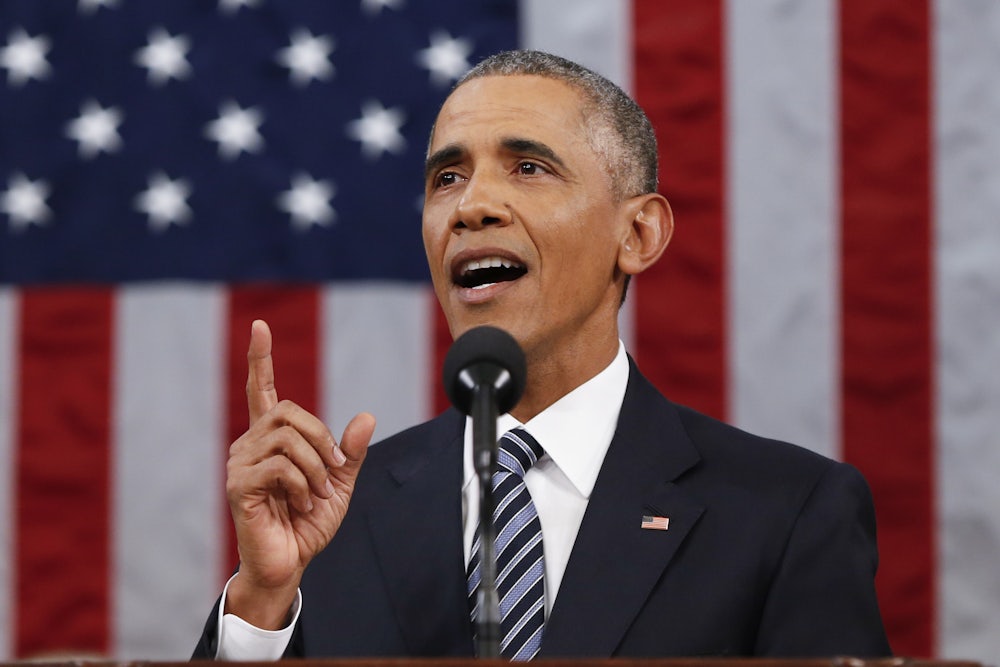In his final State of the Union address, President Obama all but called Donald Trump out by name. Instead, he tried to outline the case for optimism about America’s future: We don’t need to Make America Great Again, because America Is Great Already.
Obama sought throughout his speech to counter the narrative of declinism that Republicans have been exploiting—and which has been the hallmark of Trump’s entire campaign. He warned, first, against succumbing to the kind of fear that has fueled the revanchist politics of the right. “Each time, there have been those who told us to fear the future; who claimed we could slam the brakes on change, promising to restore past glory if we just got some group or idea that was threatening America under control,” Obama said. “And each time, we overcame those fears.”
Then Obama seemed bent on giving a fearful America a pep talk. He started out with the economy, asserting that “the United States of America, right now, has the strongest, most durable economy in the world.” The president then touted the economic gains under his watch—the victory lap one might expect from an address like this—to build up the case for confidence and against fear. “Anyone claiming that America’s economy is in decline is peddling fiction,” he said.
He attributed the lingering sense of anxiety to technological change and inequality, warning the public against scapegoating entire classes of (poor, minority) Americans for their economic struggles—again, a la Donald Trump. “Food Stamp recipients didn’t cause the financial crisis; recklessness on Wall Street did,” the president declared. “Immigrants aren’t the reason wages haven’t gone up enough; those decisions are made in the boardrooms that too often put quarterly earnings over long-term returns.” Essentially, Obama seemed to buy the theory that the rise of Trumpism is rooted in economic anxiety and insecurity, rather than racism or bigotry, as the New Republic’s Jeet Heer points out. And he believes the best counterweight is an optimistic vision for America’s future.
Obama took a similar tack with national security, effectively dismissing the Republican rhetoric of a feeble America that’s losing badly to its enemies. “I told you earlier all the talk of America’s economic decline is political hot air. Well, so is all the rhetoric you hear about our enemies getting stronger and America getting weaker,” Obama said. Then came the big applause line: “The United States of America is the most powerful nation on Earth. Period. It’s not even close,” he boasted. Woo, America!
Obama moved on to the second half of his argument: Not only is America Great Already, but our enemies are also weaker than Republicans would have you think. The president dismissed the notion that the Islamic State presents an existential threat to America, arguing that we’re “threatened less by evil empires and more by failing states”; inflating the threat would just play into our enemies’ hands. “That’s why we need to reject any politics—any politics that targets people because of race or religion,” he said to great applause. “This isn’t a matter of political correctness. It’s a matter of understanding what makes us strong.”
Instead, Obama made the case for projecting strength that’s proportionate to the actual threat that we face. “We just need to call them what they are—killers and fanatics who have to be rooted out, hunted down, and destroyed,” Obama said. America’s Reassurer-in-Chief added, “That’s exactly what we are doing.” (Caveat: America is not so great that we should “take over and rebuild every country,” Obama cautioned. Even greatness has its limits.)
Tuesday night’s address was a reprise of the Obama of Hope and Change to counter the culture of fear that Trump has exploited so successfully. “That’s the America I know. That’s the country we love. Clear-eyed. Big-hearted. Undaunted by challenge. Optimistic that unarmed truth and unconditional love will have the final word,” he said near the end of his remarks.
Much like Candidate Obama, the president held back from explicit partisanship. While he stressed the need to make a “choice” about America’s future—a nod toward the 2016 elections—he described “the rancor and suspicion between the parties” as a supreme regret of his presidency. Though his entire speech felt like a rejoinder to Trumpism, he’s left it to the Democrats themselves to take that message of strength through optimism to Republicans themselves.
